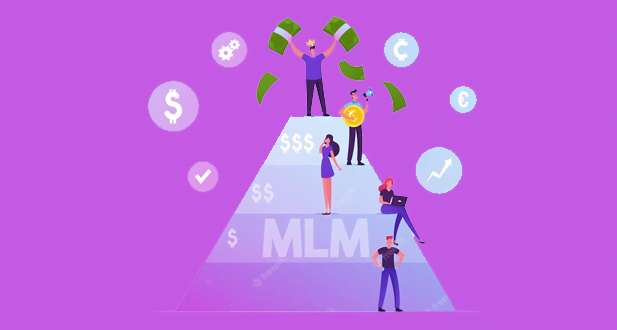What is Multi Level Marketing?
Multi Level Marketing (MLM) is a type of direct selling business model that involves recruiting independent distributors who are then responsible for selling a company’s products or services to end customers. MLM is sometimes also referred to as network marketing or referral marketing.
The structure of MLM involves a hierarchy of distributors, with each distributor being responsible for recruiting new distributors and building their own sales network. As a distributor recruits more people into their network and those people recruit others, the distributor moves up the MLM hierarchy, potentially earning commissions on the sales made by their downline. This creates a multi-level structure, hence the name multi-level marketing. One of the key benefits of MLM is that it allows people to start their own businesses with low overhead costs. As a distributor, you are essentially running your own business and are responsible for your own success. This can be appealing to individuals who want to work for themselves, but may not have the capital to start a traditional business.
Another advantage of MLM is that it can provide a flexible work schedule. Distributors can work part-time or full-time, and can often choose their own hours. This can make MLM a good option for stay-at-home parents, students, or anyone looking for a side hustle.
However, MLM has also been the subject of controversy and criticism. One of the main criticisms is that the MLM business model is inherently flawed, as the emphasis is on recruiting new distributors rather than selling products or services. This has led some to refer to MLM as a “pyramid scheme” or “Ponzi scheme.”
Another criticism of MLM is that it can be difficult to make money. While some people have been able to achieve success in MLM, the vast majority of distributors do not make a significant income. This is due in part to the fact that MLM companies often require distributors to purchase a certain amount of product each month in order to remain active, which can be costly. In addition, MLM can be a divisive business model, as distributors may become overly focused on recruiting new members rather than selling products. This can lead to a breakdown in personal relationships, as friends and family members may feel pressured to join the MLM network.
Despite these criticisms, MLM remains a popular business model, with many individuals finding success and financial freedom through MLM. Like any business opportunity, it is important to do your due diligence and thoroughly research any MLM company before getting involved. Look for companies with a strong track record, a quality product or service, and a compensation plan that is fair and transparent
MLM is a business model that involves recruiting independent distributors to sell a company’s products or services. While it has both advantages and disadvantages, it remains a popular option for those looking to start their own business and achieve financial freedom. As with any business opportunity, it is important to carefully research the company and its compensation plan before getting involved.
How Multilevel Marketing Works
Multi Level marketing (MLM) is a marketing strategy in which companies recruit salespeople to sell their products or services, often directly to consumers. These salespeople, also known as distributors, are incentivized to not only sell the products but also to recruit new distributors to the company, creating a hierarchy of salespeople with different levels of responsibility and earning potential.
At the top of the hierarchy is the company’s founder or executive team, who typically earn the most money and have the most control over the company’s operations. Below them are the top-level distributors, who have recruited the most salespeople and have the largest sales teams. These distributors often receive bonuses and commissions based on the sales of the distributors they have recruited, as well as their own sales.
The next level of distributors includes those who have been recruited by the top-level distributors, and so on, creating a pyramid-shaped organizational structure. Distributors at each level are typically encouraged to recruit new members to join their team, as this can increase their earning potential.
One of the main advantages of MLM is that it allows companies to reach a large audience quickly and efficiently, as distributors are responsible for marketing and selling the products to their personal network of friends and family, as well as to new customers they may meet through their sales efforts. However, MLM has also faced criticism for its potential to exploit vulnerable individuals who may be lured by the promise of quick and easy money. Distributors may be required to purchase products from the company to sell, and some companies may use aggressive or deceptive marketing tactics to recruit new distributors.
Additionally, the pyramid-shaped structure of MLM can often result in the majority of distributors earning very little money, with only a small percentage of top-level distributors making significant profits. This has led to some MLM companies being accused of operating as pyramid schemes, which are illegal in many countries.
MLM can be a successful marketing strategy for companies with a strong product or service and ethical business practices, but it is important for individuals considering joining an MLM company to thoroughly research the company and understand the potential risks and rewards before investing their time and money.
Features of Multi Level Marketing
Multi-Level Marketing (MLM) is a marketing strategy in which a company incentivizes its independent sales representatives to sell its products and recruit new sales representatives, who in turn sell products and recruit more representatives. MLM is sometimes called network marketing or referral marketing. There are several key features of MLM that differentiate it from other types of marketing and sales strategies.
Multi-tiered compensation structure:
One of the defining features of MLM is its multi-tiered compensation structure. Sales representatives are incentivized not only to sell products, but also to recruit new representatives who will sell products and recruit others. As a result, sales representatives can earn commissions not only on their own sales, but also on the sales of their downline, which consists of the sales representatives they have recruited and the representatives those individuals have recruited.
Focus on building a network:
Because MLM relies on sales representatives recruiting and building a downline, a key feature of MLM is its focus on building a network of sales representatives. This can involve networking events, training sessions, and other activities that are designed to help sales representatives build relationships and recruit new representatives.
Emphasis on personal development:
MLM often emphasizes personal development, encouraging sales representatives to develop skills such as communication, leadership, and time management. This can include training sessions and other resources designed to help sales representatives improve their skills and become more effective at selling products and building their downline.
Products with unique selling propositions:
MLM companies often offer products with unique selling propositions, such as health and wellness supplements, beauty products, or other items that are not readily available in stores. This can help differentiate the company’s products from competitors and make them more appealing to potential customers.
Low startup costs:
MLM companies typically have low startup costs, which can make them attractive to people who are looking to start their own business or earn extra income. Sales representatives may need to purchase a starter kit or pay a small fee to join the company, but the costs are generally much lower than the costs associated with starting a traditional business.
Flexibility:
MLM often offers a high degree of flexibility, allowing sales representatives to work from home and set their own schedules. This can make MLM a good fit for people who need to work around other commitments, such as caring for children or pursuing other interests.
Support and training:
MLM companies typically offer support and training to their sales representatives, including product training, marketing materials, and other resources designed to help representatives succeed. This can be especially valuable for people who are new to sales or entrepreneurship.
Controversy:
MLM has been the subject of controversy, with some critics arguing that it resembles a pyramid scheme or that it can exploit vulnerable individuals. However, MLM proponents argue that it can be a legitimate way to start a business or earn extra income, as long as it is done ethically and responsibly.
Advantages of Multi Level Marketing
Multi-level marketing (MLM) is a marketing strategy that involves recruiting and compensating a network of independent distributors to market and sell a company’s products or services. MLM has been around for many years and has become increasingly popular in recent years. It is a controversial business model, with some people criticizing it as a pyramid scheme while others hail it as a legitimate and effective way to sell products and earn money. In this article, we will explore some of the advantages of multi-level marketing.
Flexibility and Independence
One of the main advantages of MLM is the flexibility and independence it offers to its distributors. MLM distributors are independent contractors, which means that they can set their own schedules and work at their own pace. They have the freedom to work from home or anywhere they choose, and they can choose which products they want to market and sell.
This flexibility is especially appealing to people who are looking for a side hustle or a part-time job that they can fit around their other commitments. MLM allows people to earn money on their own terms and at their own pace, without having to commit to a traditional 9-5 job.
Low Start-Up Costs
Another advantage of MLM is that it has a low start-up cost compared to other business models. To become a distributor, you usually only need to purchase a starter kit or an initial inventory of products, which can be relatively inexpensive. This makes MLM accessible to people who might not have the capital to start a traditional business.
Additionally, many MLM companies offer training and support to their distributors, which can help them get started and succeed in their business. This support can be especially valuable to people who are new to entrepreneurship and may not have experience running a business.
Unlimited Earning Potential
One of the most appealing aspects of MLM is the unlimited earning potential it offers. MLM distributors earn money not only from their own sales but also from the sales of the distributors they recruit into their downline. This means that as your downline grows, so does your earning potential.
Additionally, many MLM companies offer bonuses and incentives to their top-performing distributors, which can provide an extra source of income. With MLM, there is no ceiling on how much money you can earn, as long as you are willing to put in the work and build a strong network of distributors.
Personal Development Opportunities
MLM also offers personal development opportunities to its distributors. To be successful in MLM, you need to develop skills such as networking, sales, and leadership. These skills can be valuable not only in your MLM business but also in other areas of your life, such as your career or personal relationships.
Many MLM companies offer training and development programs to help their distributors develop these skills. These programs can provide a valuable opportunity for personal growth and development.
Access to High-Quality Products
Another advantage of MLM is that it provides access to high-quality products that may not be available in traditional retail stores. MLM companies often specialize in niche products, such as health supplements, beauty products, or eco-friendly cleaning supplies. These products are often of high quality and may be difficult to find in traditional stores.
By becoming an MLM distributor, you can gain access to these high-quality products and potentially introduce them to a wider audience. This can be especially appealing to people who are passionate about a particular product or niche and want to share it with others.
Community and Support
Finally, MLM offers a sense of community and support to its distributors. MLM distributors often work together as a team to support each other and share tips and strategies for success. This can be especially valuable to people who are new to entrepreneurship and may feel isolated or overwhelmed.
Conclusion
Multi-Level Marketing (MLM) is a business model that has been around for decades and has generated both success stories and controversies. MLM companies rely on a network of distributors to sell products or services, with each distributor earning commissions on their own sales as well as on the sales made by those they recruit into the network.
While MLM can offer individuals the opportunity to start their own business and potentially earn significant income, there are several concerns associated with the model. For instance, some MLM companies have been accused of operating pyramid schemes, which prioritize recruiting new distributors over selling products or services.
Frequently Asked Questions
It is possible to make money with MLM, but it requires a lot of hard work, dedication, and sales skills. Success in MLM also depends on factors such as the company’s compensation plan, the demand for the product or service, and the size of your downline.
Starting an MLM business can be a good option for those who want to work for themselves and have a flexible schedule. However, it’s important to approach MLM with a realistic mindset and understand that success is not guaranteed.
Joining multiple MLM companies at once is not recommended, as it can be difficult to balance the demands of multiple businesses and may lead to conflicts of interest.
Recruiting new members to your downline requires sales skills and networking abilities. You may need to attend events, reach out to your personal network, or use social media to find potential recruits.
Whether or not MLM is right for you depends on your personal goals, skills, and interests. If you enjoy sales and networking and are willing to put in the hard work required to build a successful downline, then MLM may be a good fit for you. However, if you are uncomfortable with the idea of recruiting others or don’t enjoy sales, then MLM may not be the right choice.




